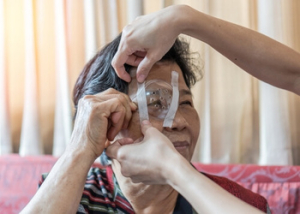Visual Problems After Cataract Surgery: Understanding And Managing Post-Surgery Challenges
Cataract surgery is a common procedure that effectively restores clear vision by removing the cloudy lens from the eye and replacing it with an artificial lens. Although the surgery is generally straightforward and successful, it’s important to understand that some visual problems after cataract surgery are bound to happen as part of the recovery process.
This article will provide an overview of what to expect, the types of visual problems that may occur, and how to manage them effectively.
Understanding Cataract Surgery
Cataract surgery is designed to enhance vision by replacing the foggy, natural lens with a clear, artificial lens called an intraocular lens (IOL). The procedure is generally done on an outpatient basis, meaning you can return home the same day.
What To Expect When Getting Cataract Surgery
 Before undergoing cataract surgery, it’s essential to understand the procedure and what will happen during and after the surgery.
Before undergoing cataract surgery, it’s essential to understand the procedure and what will happen during and after the surgery.
This preparation helps set realistic expectations and ease any concerns about the recovery process.
The Procedure: What Happens During Surgery?
The surgery begins with the administration of local anaesthesia to numb the eye. A small incision is made in the cornea, allowing the eye professional to access and remove the cloudy lens.
After removing the old lens, the surgeon inserts the artificial lens into the lens capsule. The procedure mostly lasts about 30 minutes to an hour.
What To Expect During the Recovery Period
After cataract surgery, you may feel some mild discomfort, which is normal. Your vision might be blurry at first, but it should improve as your eye heals.
It’s important to use prescribed eye drops and follow your doctor’s instructions to support healing and prevent complications.
Common Visual Problems After Cataract Surgery
Although cataract surgery is highly effective, some visual problems can occur during the recovery process.
This section explores common issues you may experience and offers insights into why they happen and how they can be managed.
Blurry Vision
Blurry vision is a common issue immediately following cataract surgery. It is often temporary as the eye adjusts to the new artificial lens. It can also be influenced by inflammation or the natural healing process. Most patients find that their vision improves significantly as they continue to heal.
Cloudy Vision
Cloudy vision can occur due to a condition referred to as posterior capsule opacification (PCO) or secondary cataract. Posterior capsule opacification is a common issue where the lens capsule becomes foggy after cataract surgery. This condition can be managed effectively with a YAG laser capsulotomy to restore clear vision.
Light Sensitivity
Increased sensitivity to bright lights is another common symptom after cataract surgery. Light sensitivity is a normal reaction as your eye adjusts to the new lens and recovers. Wearing sunglasses or protective eyewear can help alleviate discomfort and protect your eyes from bright lights.
Dry Eyes
Dry eyes are a frequent issue after cataract surgery. This symptom occurs because the surgery can temporarily affect the tear production and eye surface. Artificial tears or prescribed eye drops can help keep your eyes moist and comfortable during recovery.
Retinal Detachment
Though not as common, retinal detachment is a severe issue that can occur after cataract surgery. If not treated right away, it may lead to serious vision problems. Symptoms include sudden floaters, light flashes, or a curtain-like shadow over your vision. Prompt medical care is crucial to prevent permanent vision loss.
Managing Visual Problems After Cataract Surgery
Managing visual problems effectively involves following your eye doctor’s instructions and taking proactive steps to support recovery. This section provides practical advice on managing common issues and ensuring a simple healing process.
Follow Your Doctor’s Instructions
 Adhering to your eye doctor’s post-surgery instructions is essential for a successful recovery. Your eye surgeon will provide specific instructions regarding medication, eye drops, and activity restrictions. Following these instructions carefully helps prevent complications and supports the healing process.
Adhering to your eye doctor’s post-surgery instructions is essential for a successful recovery. Your eye surgeon will provide specific instructions regarding medication, eye drops, and activity restrictions. Following these instructions carefully helps prevent complications and supports the healing process.
Attend Follow-Up Appointments
Regular follow-up visits are crucial for monitoring your recovery and addressing any concerns. Attending follow-up appointments allows your eye doctor to check your progress, manage any issues, and ensure your eye is healing correctly. These visits are an important part of the recovery process.
Avoid Strenuous Activities
During recovery, it’s important to avoid activities that could strain your eyes or disrupt the healing process. Avoid heavy lifting, intense physical exercise, and activities that strain your eyes. Stick to light activities and follow your doctor’s advice to ensure a smooth recovery.
Manage Light Sensitivity
Protective measures can help alleviate light sensitivity. Wearing sunglasses or hats with brims can help reduce discomfort from bright lights. This simple step should make a substantial difference in managing light sensitivity during recovery.
Address Dry Eyes
Managing dry eyes involves using appropriate treatments to keep your eyes moist and comfortable. Artificial tears or prescribed eye drops are effective for managing dry eyes. If dry eyes persist, consult your eye doctor for additional treatment options.
Recognise Common Symptoms And Seek Help When Needed
Being aware of common symptoms and knowing when to seek medical attention is important for managing your recovery. If you experience persistent blurred vision, significant discomfort, or symptoms of infection, contact your eye doctor immediately. Early intervention can prevent complications and support a successful recovery.
Frequently Asked Questions
Can cataract surgery affect night vision?
After cataract surgery, some patients may notice changes in night vision, such as increased glare or halos around lights. These symptoms often improve as the eye heals. If night vision issues persist, consult your eye doctor for further evaluation.
Will I need new glasses after the cataract procedure?
After cataract surgery, you should experience improved vision. However, you may need new glasses for specific tasks like reading or driving. Your eye professional will examine your vision and provide a prescription if needed during your follow-up appointments.
Can I wear contact lenses again after cataract surgery?
Contact lenses are usually not recommended immediately after cataract surgery. Your eye expert will advise you on when it is okay to carry on wearing contact lenses, typically after your eye has fully healed and vision has stabilised.
When can I wear makeup again after cataract surgery?
To prevent infection, it’s generally advised to avoid eye makeup for at least two weeks after cataract surgery. Consult your eye doctor for specific instructions about when it is fine to resume wearing makeup.
What should I do if my vision does not improve after cataract surgery?
If your vision does not improve or you continue to experience significant visual problems, it’s important to contact your eye doctor. They can evaluate your condition to determine any underlying issues or if additional treatment is necessary.
How can I prevent eye infections after cataract surgery?
To prevent infection after cataract surgery, use prescribed eye drops as directed and avoid touching or rubbing your eyes. Additionally, keep your eye area clean and follow any specific hygiene instructions your doctor provides.
What is YAG laser capsulotomy, and when is it needed?
YAG laser capsulotomy is a surgical treatment used to manage posterior capsule opacification. It entails utilising laser to remove the hazy lens capsule and restore clear eyesight. If you have cloudy vision following cataract surgery, this procedure is used.
Final Thoughts On Managing Visual Problems Post-Cataract Surgery
 Cataract surgery is a highly beneficial procedure for restoring clear vision and enhancing quality of life. While some visual problems after cataract surgery are expected, understanding what to expect and how to manage these problems can help ensure a successful outcome.
Cataract surgery is a highly beneficial procedure for restoring clear vision and enhancing quality of life. While some visual problems after cataract surgery are expected, understanding what to expect and how to manage these problems can help ensure a successful outcome.
Following your eye doctor’s recommendations, attending follow-up appointments, and addressing any concerns promptly can help you accomplish the best possible results from cataract surgery.
If you’re experiencing visual problems after cataract surgery or have any questions about your recovery, we are here to help. Our expert team in Melbourne is committed to providing personalised care and expert guidance to ensure you achieve the best possible outcome.
Call Mornington Peninsula Eye Clinic at (03) 9070 3580. Your journey to a clearer vision starts with just one call!
Note: Any surgical or invasive procedure carries risks. Before proceeding, you should seek a second opinion from an appropriately qualified health practitioner.
Sources:
Awh C, Goshe J M, Masters J Scott, DelMonte D W, Houser K & Gurnani B 2024. Posterior Capsule Opacification. EyeWiki. Available at: https://eyewiki.org/Posterior_Capsule_Opacification [Accessed September 18, 2024]
Cleveland Clinic 2023. Cataract Surgery. Cleveland Clinic. Available at: https://my.clevelandclinic.org/health/treatments/21472-cataract-surgery [Accessed September 18, 2024]
Healthdirect Australia 2024. Cataracts. Healthdirect. Available at: https://www.healthdirect.gov.au/cataracts [Accessed September 18, 2024]
Millar H 2023. What to know about floaters after cataract surgery. Medical News Today. Available at: https://www.medicalnewstoday.com/articles/floaters-after-cataract-surgery [Accessed September 18, 2024]
Naderi K, Gormley J & O’Brart D 2020. Cataract surgery and dry eye disease: A review. European Journal of Ophthalmology 30, 840–855. 10.1177/1120672120929958






Leave a Reply
Want to join the discussion?Feel free to contribute!